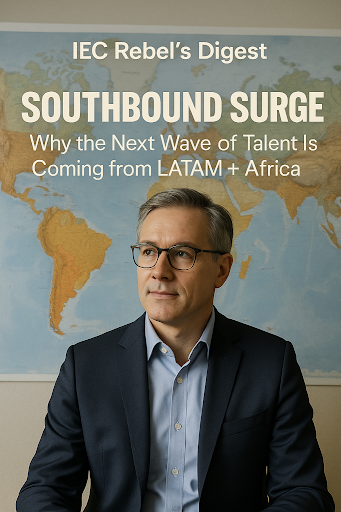Why the Next Wave of Talent Is Coming from LATAM + Africa
Executive Summary
 In 2025, the global talent map is being redrawn — and it’s shifting south. As traditional tech hubs grow saturated, expensive, and demographically older, a new surge of skilled, cost-efficient, and remote-ready professionals is rising from Latin America and Africa.
In 2025, the global talent map is being redrawn — and it’s shifting south. As traditional tech hubs grow saturated, expensive, and demographically older, a new surge of skilled, cost-efficient, and remote-ready professionals is rising from Latin America and Africa.
This isn’t just about finding cheaper labor. It’s about tapping into growing youth populations, expanding digital infrastructure, and emerging tech ecosystems that are increasingly shaping the future of work. From Nigerian developers to Colombian ops managers, the Global South is not just catching up — it’s leapfrogging.
In this edition of IEC Rebel’s Digest, we unpack:
- Why demographic and economic shifts are making LATAM and Africa the new global hiring hotspots
- How smart companies are adapting compensation, equity, and compliance strategies for these regions
- The cultural and operational playbook you need to succeed — and the risks you can’t ignore
Forget outdated “hire anywhere” slogans. The winners of 2025 are hiring with precision, purpose, and regional fluency.
The Southbound Surge is already underway. The only question is: are you riding the wave — or missing the boat?
[Read the full article →]
It used to be simple: hire from the US, UK, Germany, maybe India. Tech hubs, fluent in English, predictable regulation. But 2025 has different plans.
Welcome to the Southbound Surge — a seismic shift in global talent flows toward Latin America and Africa. Quietly and quickly, these regions have become the new frontier for ambitious companies seeking talent that’s not only affordable, but increasingly skilled, startup-savvy, and future-focused.
The global workforce isn’t flattening — it’s rebalancing. If you’re still building your team like it’s 2019, you’re not just behind. You’re irrelevant.
🌍 What’s Fueling the Southbound Surge?
- Demographics: The Workforce is Young and Growing
While Western economies grapple with aging populations and shrinking labor forces, Africa and Latin America are booming:
- Africa will account for over 40% of the global youth population by 2030. Nigeria alone adds nearly 5 million new job seekers per year.
- Latin America has a large urbanized, educated population with strong mobile connectivity and a growing middle class.
These aren’t future workforces — they’re here now. Ready, eager, and increasingly digital-native.
- Remote Work Is No Longer a Perk — It’s Infrastructure
The pandemic forced companies to decentralize. Now, LATAM and Africa are reaping the long-term benefits:
- In Mexico, Colombia, Nigeria, and Kenya, remote work isn’t just tolerated — it’s part of tech culture.
- Fiber rollouts, satellite internet (Starlink), and public-private initiatives have improved connectivity in many second-tier cities.
The result? It’s easier than ever to collaborate across borders — especially when time zones align neatly with North America and Europe.
- Cost Meets Capability
Let’s not kid ourselves: payroll savings are still a driver. But this isn’t about outsourcing on the cheap.
- Developers in Brazil or Tunisia can now command respectable rates — but they’re still 30–50% lower than in London or San Francisco.
- LATAM and African professionals are increasingly polyglot, culturally agile, and project-experienced, especially in startups and creative industries.
Smart companies know this isn’t a budget hack. It’s a capability gain at an efficient cost.
🧠 Strategic Shifts: What the Best Companies Are Doing Differently
- Moving Beyond “Hire Anywhere” — Toward “Hire With Purpose”
Hiring globally used to mean posting a job and hoping the best CVs floated to the top. Now, top players are:
- Mapping regional talent clusters — like design talent in Buenos Aires, backend devs in Accra, or fintech ops in Lagos.
- Building partnerships with local bootcamps and universities, not just relying on global platforms.
They’re not “open to remote” — they’re targeting regions based on strategic alignment.
- Localized Compensation and Equity Planning
Paying “San Francisco rates everywhere” is dead. But so is ignorance-based underpayment. Winning teams:
- Localize salary benchmarks using real-time tools like Figures, Ravio, or Deel’s compensation reports.
- Adapt equity plans to legal realities: phantom shares or stock appreciation rights (SARs) in countries with limited securities infrastructure.
- Offer locally relevant benefits (think: private healthcare in Nigeria, family allowances in Colombia).
Pro tip: run your comp model through a regional reality check every quarter. Inflation and currency shifts are brutal if ignored.
- EOR, but Upgraded
The smart shift isn’t just “get an EOR to hire in Brazil.” It’s partnering with EORs that understand the cultural, operational, and regulatory nuances.
Ask:
- Does your EOR offer language-local onboarding?
- Do they understand 13th-month salary norms, cost-of-living stipends, or local termination protections?
- Can they handle currency volatility and local tax complexities?
If not, they’re a paperwork provider — not a growth partner.
🔒 Risk Watch: Compliance Isn’t Optional
- Data Protection Laws Are Maturing Fast
Think GDPR is the gold standard? It was. But now:
- Brazil’s LGPD, Nigeria’s NDPR, Kenya’s Data Protection Act, and South Africa’s POPIA are in full force.
- Data sovereignty matters — especially if you’re handling personal, payroll, or health-related information.
You need region-specific data handling policies, ideally embedded into your HRIS and EOR processes. Cross-border payroll dumps via Excel? You’re asking for a fine.
- Worker Classification Is a Global Headache
Many employers are tempted to engage talent via freelance contracts or “consulting” agreements. But:
- In Colombia, “independent contractors” can trigger employer obligations if treated like employees.
- South Africa and Kenya have clear thresholds for “deemed employment.”
- Peru, Chile, and Nigeria have complex severance and labor union triggers for term contracts.
Play loose with classification, and you risk retroactive taxes, penalties, or even bans.
Use local counsel or classification services — or better, work through a compliance-first EOR that doesn’t treat contractor vs. employee as a checkbox.
🤝 Culture Eats Compliance for Breakfast
Yes, compliance matters. But culture is what makes teams thrive — or implode.
- Work Rhythms Are Not Universal
- In many African countries, workdays start early and end early. In LATAM, siesta-influenced rhythms still influence scheduling.
- WhatsApp is often used professionally, which may feel informal to EU-based teams.
- Hierarchy and title respect can be stronger in some cultures — “flat” organizations often confuse or frustrate.
Cultural fluency matters. Train your managers, use local coaches, and avoid assuming your HQ style works everywhere.
- Trust Must Be Earned Across Borders
Remote doesn’t mean detached. In fact, LATAM and African workers often value:
- Direct, personal feedback
- Regular, humanized check-ins
- Recognition and inclusion in strategic decisions, not just operational tasks
The best global leaders build cross-cultural trust. That takes time, intentionality, and empathy.
📈 The Takeaway: Get In Early, Build Right
The Southbound Surge isn’t a trend — it’s a global talent realignment. Companies that move early, build deep regional knowledge, and invest in sustainable structures will have:
- Access to future-forward skills
- Resilient, diversified teams
- Lower payroll overhead
- A head start on global brand recognition in emerging markets
Those that wait? They’ll find themselves priced out, talent-bereft, and caught in compliance quicksand.
🚨 Rebel’s Reality Check
Don’t:
- Hire across borders without clear classification and payroll models.
- Treat LATAM or Africa like budget labor markets.
- Assume your EOR has local expertise — ask hard questions.
Do:
- Build long-term hiring strategies for regional clusters.
- Localize everything: comp, benefits, onboarding, communication.
- Treat these hires like core team members — because they are.
The South is not rising. It’s already here.
Written by the IEC Rebel Editorial Team — experts in workforce and HR technology with over decades of experience advising global corporations on digital transformation and HR innovation. For more deep dives, visit [www.theIECgroup.com].
👤 Go To’s for HR & CxO Executives:
Identify 1–2 LATAM or African talent hubs aligned with your needs. Review your comp, onboarding, and compliance model for regional fit. Start building trusted partnerships now.
🧩 Go To’s for EOR & Recruiting Companies:
Localize your value proposition: offer region-specific payroll, equity, and cultural support. Develop deep expertise in 3–5 priority markets. Don’t sell “global” — sell grounded.
IEC Rebel’s Digest— The IEC Group can help you audit your global employment setup by identifying labor leasing risks, verifying licensing requirements, and ensuring your EOR partners meet every compliance standard—before regulators come knocking.
Last but not Least: If you’re facing challenges and wondering how others are managing similar issues, why not join The Leadership Collective Community? It’s a peer group and webcast platform designed for leaders to exchange insights and experiences.
Introducing the IEC Knowledge Network Free Membership – Your Gateway to Seamless Access!
We are thrilled to present a new service that goes beyond the ordinary download experience. In addition to offering you the ability to download the things you love, we are delighted to introduce the IEC Knowledge Network Free Membership.
The Free Membership option grants you access to our library of articles and videos, without the need for tedious registrations for each piece of content.
The publication serves as a trusted resource to support executives in their pursuit of sustainable and successful global expansion. In addition the IEC Practitioners are available to discuss your specific challenge in more detail and to give you clear advise..
Take advantage of this valuable resource to accelerate your global expansion journey


